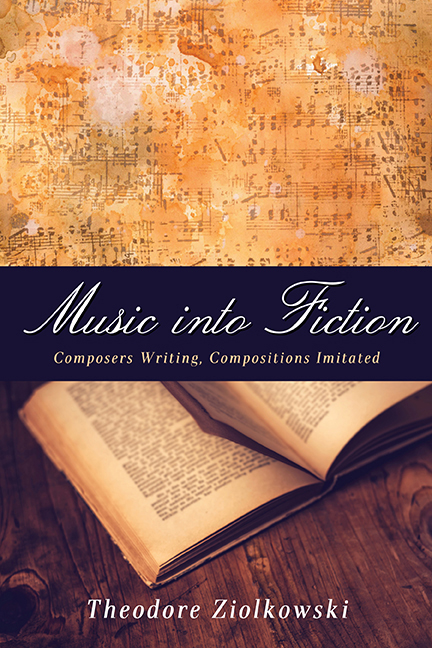Book contents
- Frontmatter
- Dedication
- Contents
- Preface
- Prelude: Introduction
- First Movement: Composers Writing
- 1 Weber and Hoffmann
- 2 Berlioz and Schumann
- 3 Wagner
- 4 Transition: Nietzsche and the Post-Wagnerians
- 5 Burgess
- Second Movement: Compositions Imitated
- Finale: Composers Setting Fictional Compositions
- Coda: Conclusion
- Bibliography
- Index
3 - Wagner
from First Movement: Composers Writing
Published online by Cambridge University Press: 09 May 2017
- Frontmatter
- Dedication
- Contents
- Preface
- Prelude: Introduction
- First Movement: Composers Writing
- 1 Weber and Hoffmann
- 2 Berlioz and Schumann
- 3 Wagner
- 4 Transition: Nietzsche and the Post-Wagnerians
- 5 Burgess
- Second Movement: Compositions Imitated
- Finale: Composers Setting Fictional Compositions
- Coda: Conclusion
- Bibliography
- Index
Summary
The Composer as Writer
In 1841, during his Paris years, Richard Wagner (1813–83) first previewed for French readers, and subsequently reviewed for a German audience, a performance of Der Freischütz at the Grand Opéra. Wagner admired Weber, whom in his tome Oper und Drama (1851, Opera and Drama) he called “this noble, lovable Weber, aglow with a pious faith in the omnipotence of his pure Melody, vouchsafed him by the fairest spirit of the Folk.” In 1841, as conductor of the Royal Opera in Dresden, Wagner was largely responsible for the relocation of Weber's remains from London to Dresden, and in his speech at the interment he named Weber the most German musician who ever lived.
Der Freischütz had been presented to the Parisian public almost twenty years earlier in the butchered adaptation by Castel-Blaze (F. H. J. Blaze) as Robin des bois (1824). The new production sought, in contrast, to remain true to the original, but its director—none other than Hector Berlioz—was required by custom and the Opéra's managers to make certain changes: to replace the peasant dances with ballets and the spoken dialogue with recitatives. “You wanted Ballet and Recitative,” Wagner told his French readers in the Gazette Musicale (May 23 and 30, 1841),
and have chosen the most original of your composers to make the music for them. That him you have chosen, honours you, and proves that you value our master-work. I know no single living French musician who would understand the score of the “Freischütz” so well as the author of the Symphonie fantastique, or be so qualified to supplement it, were that needful. He is a man of genius, and none knows better than myself the restless force of his poetic verve.
Wagner met Berlioz in Paris, and although their conceptions of music— notably melody versus polyphony—increasingly alienated them, he admired “the inventive genius of your greatest instrumental composer” (181), and Berlioz's Symphonie fantastique, which impressed Wagner immensely amidst what he regarded as the general shallowness of musical life in the French capital, is thought to have been an influence on his Faust-Ouvertüre (1840).
- Type
- Chapter
- Information
- Music into FictionComposers Writing, Compositions Imitated, pp. 58 - 82Publisher: Boydell & BrewerPrint publication year: 2017

